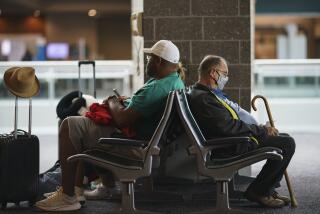Taking Care of Ill Hearts During Those Long Flights
- Share via
Flying can be hazardous to your health, contends British author Farrol S. Kahn. His father, who suffered from high blood pressure, died of a massive heart attack after a long flight.
Kahn proposes a variety of measures, some unusual, for maintaining health aloft. Representatives for the airlines say some of his suggestions are overkill.
Farrol S. Kahn, aviation researcher and author of “The Curse of Icarus”:
“Most important to consider is the relative lack of oxygen (aloft). If a person has high blood pressure or congenital heart disease, it can tip him over into the crisis stage. (These passengers should) ask for oxygen on board.”
Other measures: “Scuba divers should allow at least 12 hours after the last dive (before flying). If they exceed 30-foot depths, allow at least 24 hours (before flying) to avoid decompression sickness, or the bends.
“Attend to a loose dental filling, or the air around it will expand (during flight) and be painful.
“Don’t fly too soon after surgery. You should wait five days after surgery to fly.”
Dr. Tom Wightman, staff physician, American Airlines, Fort Worth, Tex.:
“Most of these suggestions make sense for the average flier. Not flying after surgery (for instance) is a good idea.
“But the odds of a (loose) dental filling giving you problems during a commercial flight are small. It’s more likely to happen to a fighter pilot at very high altitudes.
“If you have a severe heart problem or severe high blood pressure, I would agree with his approach. But the average person on high blood-pressure medication doesn’t need (supplemental) oxygen. If you are unsure, contact your doctor first. If he or she thinks you need oxygen, he or she can contact the airline well ahead of the flight. There is a charge for oxygen.”
More to Read
Sign up for The Wild
We’ll help you find the best places to hike, bike and run, as well as the perfect silent spots for meditation and yoga.
You may occasionally receive promotional content from the Los Angeles Times.






